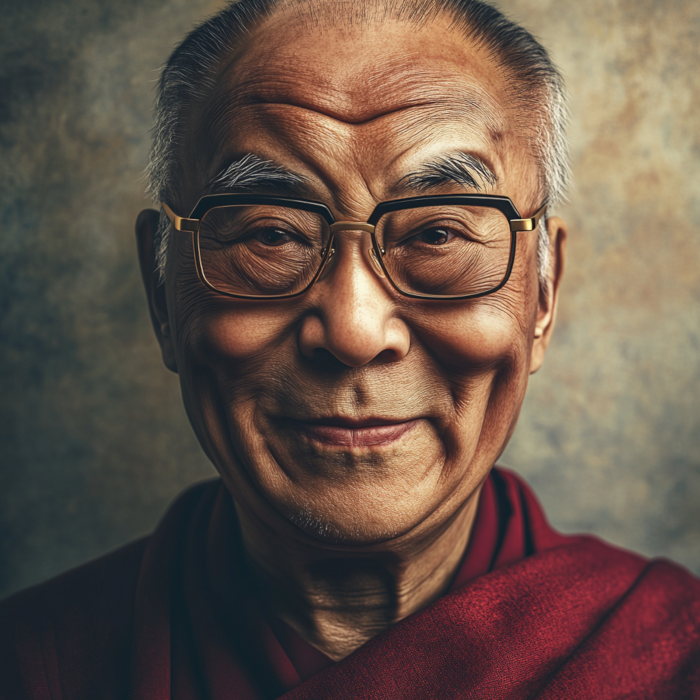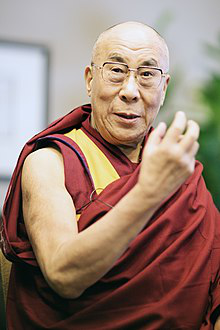

spiritual leader (Tibetan Buddhism)

The Dalai Lama is the spiritual leader of Tibetan Buddhism and has historically been the political leader of Tibet. The title "Dalai Lama" means "Ocean of Wisdom," and the Dalai Lama is considered to be the reincarnation of Avalokiteshvara, the Bodhisattva of Compassion. The current Dalai Lama, Tenzin Gyatso, is the 14th Dalai Lama and is one of the most prominent global spiritual leaders, known for his teachings on compassion, nonviolence, and human rights.
Birth: The 14th Dalai Lama was born on July 6, 1935, in the small village of Taktser in the Amdo region of northeastern Tibet. His birth name was Lhamo Thondup, and he was born into a farming family.
Recognition as the Dalai Lama: At the age of two, Lhamo Thondup was recognized as the reincarnation of the 13th Dalai Lama, Thubten Gyatso. Tibetan monks, following traditional methods and spiritual signs, identified him as the next Dalai Lama. He was taken to Lhasa, the capital of Tibet, where he began his formal education and spiritual training.
Enthronement: He was formally enthroned as the 14th Dalai Lama on February 22, 1940, at the age of four. His education was rigorous, covering Buddhist philosophy, logic, Tibetan art and culture, Sanskrit, and medicine, alongside other subjects.
Political and Spiritual Leadership: The Dalai Lama assumed full political power in Tibet at the age of 15 in 1950, during a period of increasing tension with the People's Republic of China, which had asserted control over Tibet. Despite efforts to negotiate with Chinese authorities, the situation escalated.
Tibetan Uprising and Exile: In 1959, following a failed uprising against Chinese rule, the Dalai Lama fled Tibet and sought asylum in India. He settled in Dharamshala, in the state of Himachal Pradesh, where he established the Tibetan government-in-exile, which continues to function today.
Life in Exile: Since his exile, the Dalai Lama has focused on preserving Tibetan culture, advocating for the rights and autonomy of Tibetans, and spreading his message of peace, compassion, and nonviolence. He has traveled extensively, meeting with global leaders, engaging in dialogue with religious and cultural figures, and giving teachings and lectures around the world.
Compassion and Nonviolence: Central to the Dalai Lama's teachings is the importance of compassion and kindness. He emphasizes that all human beings seek happiness and wish to avoid suffering, and therefore, compassion should be the basis of all human interactions. He is a staunch advocate of nonviolence (ahimsa) and believes that conflicts should be resolved through dialogue and understanding rather than violence.
Interfaith Dialogue: The Dalai Lama is committed to promoting harmony and understanding among different religions. He frequently engages in interfaith dialogue and encourages people of all faiths to respect each other and to work together for the common good.
Buddhist Teachings: As a spiritual leader, the Dalai Lama teaches the core principles of Tibetan Buddhism, including the Four Noble Truths, the practice of meditation, and the cultivation of wisdom and compassion. He also emphasizes the concept of "dependent origination," which teaches that all phenomena are interconnected and that nothing exists independently.
Secular Ethics: In addition to his religious teachings, the Dalai Lama advocates for "secular ethics," a set of universal values such as compassion, tolerance, and forgiveness that can be practiced by people of all faiths or none. He believes that these values are essential for creating a more peaceful and just world.
Tibetan Independence and Autonomy: The Dalai Lama has long advocated for the rights of the Tibetan people and the preservation of Tibetan culture and religion. While initially calling for full independence for Tibet, he later adopted a "Middle Way" approach, seeking genuine autonomy for Tibet within the framework of the People's Republic of China. This approach calls for self-governance in matters of religion, culture, education, and environmental protection, while accepting Chinese sovereignty.
Global Support and Recognition: The Dalai Lama's efforts have garnered significant international support, and he has been a prominent figure in the global movement for human rights. His advocacy for Tibet has raised awareness about the plight of Tibetans under Chinese rule and the destruction of Tibetan culture.
Nobel Peace Prize: In 1989, the Dalai Lama was awarded the Nobel Peace Prize in recognition of his nonviolent struggle for the liberation of Tibet and his efforts to promote peace and human rights globally. The Nobel Committee praised his consistent opposition to the use of violence in the Tibetan struggle and his advocacy for peaceful resolution through dialogue.
Cultural and Spiritual Impact: The Dalai Lama is one of the most respected and influential spiritual leaders in the world. His teachings on compassion, ethics, and interfaith dialogue have inspired millions of people worldwide. He has written numerous books on Buddhism, ethics, and philosophy, many of which have become bestsellers.
Global Ambassador of Peace: Beyond his role as the leader of Tibetan Buddhism, the Dalai Lama is recognized as a global ambassador of peace. His message of universal compassion and his efforts to bridge cultural and religious divides have earned him admiration and respect from people of all walks of life.
Retirement from Political Role: In 2011, the Dalai Lama announced his retirement from political duties, handing over political leadership to the democratically elected Prime Minister of the Tibetan government-in-exile. He has since focused more on his spiritual teachings and personal reflection.
Relations with China: The Dalai Lama's advocacy for Tibetan autonomy has led to strained relations with the Chinese government, which views him as a separatist. China has consistently opposed his international visits and has exerted pressure on foreign governments not to meet with him.
Succession and Future of the Dalai Lama Institution: The issue of succession is a significant challenge, as the Dalai Lama has expressed uncertainty about whether he will reincarnate or whether the institution of the Dalai Lama should continue. He has suggested that his successor could be chosen democratically or even that he may be the last Dalai Lama, leaving the question of Tibet's spiritual leadership open.
The 14th Dalai Lama, Tenzin Gyatso, has played an extraordinary role as a spiritual and political leader, a symbol of nonviolent resistance, and an advocate for global peace and human rights. His teachings on compassion, nonviolence, and the unity of all beings have resonated far beyond the borders of Tibet, making him a revered figure worldwide. Despite the challenges he has faced, including his long exile from Tibet, the Dalai Lama continues to inspire people across the globe with his wisdom, humility, and unwavering commitment to peace.

We use cookies
We use cookies and other tracking technologies to improve your browsing experience on our website, to show you personalized content and targeted ads, to analyze our website traffic, and to understand where our visitors are coming from. Privacy Policy.